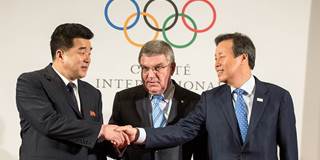Throughout the history of the modern Olympic Games, the event has served as a platform for nationalism, but also for advancing peace and human dignity in the spirit of friendly competition. When the Games begin next month on the tumultuous Korean Peninsula, one hopes the legacy of peacemaking and rapprochement prevails.
MADRID – Pierre de Coubertin, the founder of the modern Olympic Games, famously said, “The most important thing is not to win, but to take part.” Now that North Korea has agreed to participate in the upcoming Winter Olympics in the South Korean city of Pyeongchang, that phrase has taken on new meaning.
Throughout the history of the modern Olympic Games, separating politics from sports has been impossible. Perhaps it is not even desirable. After all, one of the Games’ primary objectives is to put sports at the service of peace and human dignity.
More broadly, sports have long played a politically constructive role on the world stage. At the 1971 World Table Tennis Championships in Japan, an American player hitched a ride on the Chinese team’s bus, inaugurating what became known as “ping-pong diplomacy.” Soon after, at the height of the Cultural Revolution no less, Mao Zedong invited the US table tennis team to China, paving the way for US President Richard Nixon’s historic visit there in 1972.

MADRID – Pierre de Coubertin, the founder of the modern Olympic Games, famously said, “The most important thing is not to win, but to take part.” Now that North Korea has agreed to participate in the upcoming Winter Olympics in the South Korean city of Pyeongchang, that phrase has taken on new meaning.
Throughout the history of the modern Olympic Games, separating politics from sports has been impossible. Perhaps it is not even desirable. After all, one of the Games’ primary objectives is to put sports at the service of peace and human dignity.
More broadly, sports have long played a politically constructive role on the world stage. At the 1971 World Table Tennis Championships in Japan, an American player hitched a ride on the Chinese team’s bus, inaugurating what became known as “ping-pong diplomacy.” Soon after, at the height of the Cultural Revolution no less, Mao Zedong invited the US table tennis team to China, paving the way for US President Richard Nixon’s historic visit there in 1972.